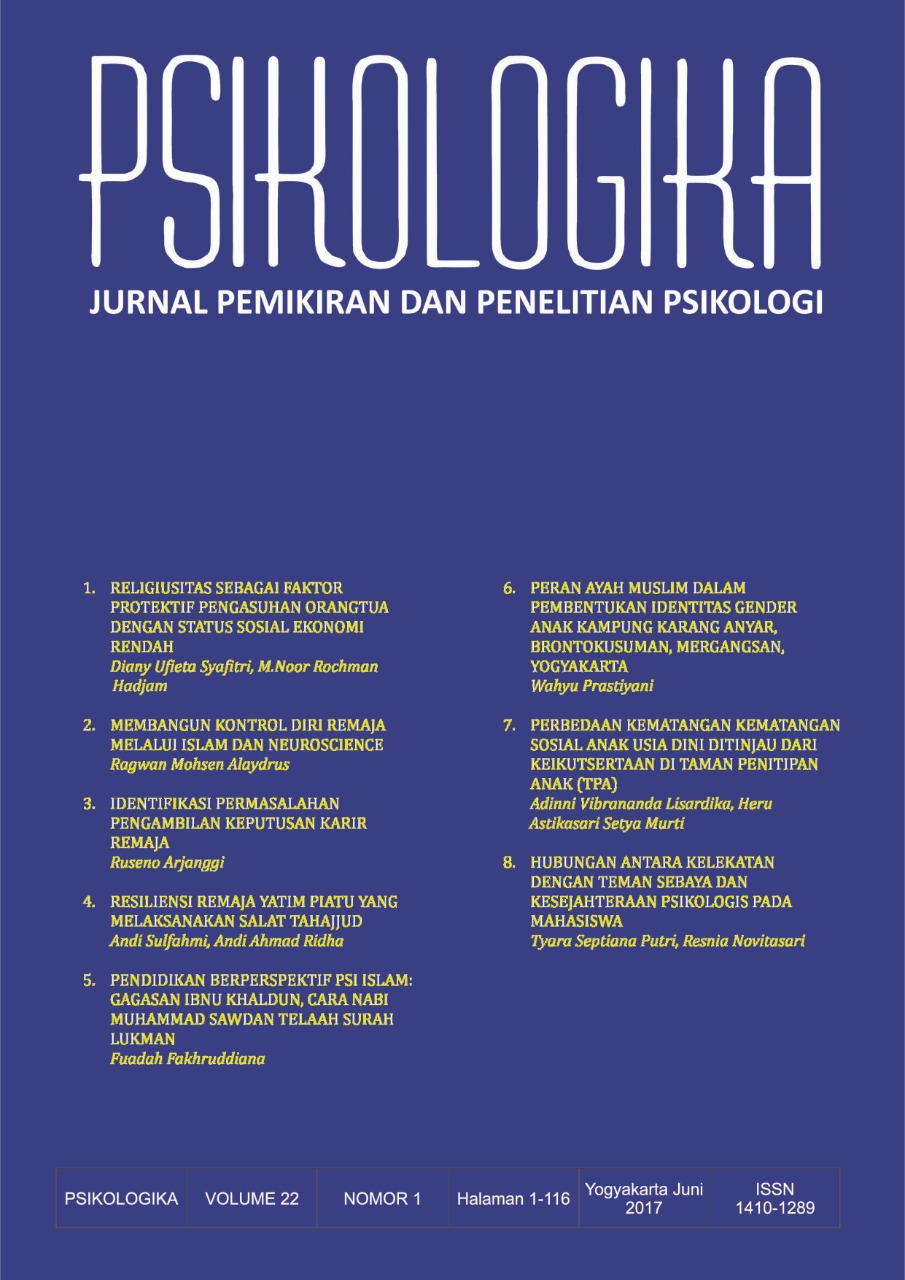Main Article Content
Abstract
The low family socioeconomic status (SES) often resulted in variety of negative impact towards child development. One of the mechanism how SES affect children is through parenting. In family with low SES, many parents experience stress due to economic pressure that they implement harsh parenting practices. This then leads to various negative impact in children psychological development. One of the most significant protective factor to reduce the negative impact of low SES is religiosity. Based on the
dimensions of religiosity, this research tried to capture how religiosity among low SES parents can serve as protective factor. The subjects of this research three low SES parents who considered as religios by local people and their children managed to achieve high education. The research method is quallitative with in-depth interview. The data analysis employed by coding, formulating units of meaning, and categorization. The results showed that based on the five dimensions of religiosity, all three subjects have adequate religious knowledge particularly related to religionbased
parenting knowledge, then this followed by intensive and devoted religious
ritual, and from experiential dimension they often experience grace and closeness to Allah SWT. The impact of those five dimensions of religiosity is they are able to show many positive virtues which enables them to overcome various obstacles the low SES brought. Those virtues are patience, sincere, nrimo (acceptance), pasrah (surrender), and optimistic. They also then transmitted their religiosity to their children with value
internalization and guiding worship rituals.
Keywords: low soscioeconomic status, parenting, protective factor, positive virtues, religosity
dimensions of religiosity, this research tried to capture how religiosity among low SES parents can serve as protective factor. The subjects of this research three low SES parents who considered as religios by local people and their children managed to achieve high education. The research method is quallitative with in-depth interview. The data analysis employed by coding, formulating units of meaning, and categorization. The results showed that based on the five dimensions of religiosity, all three subjects have adequate religious knowledge particularly related to religionbased
parenting knowledge, then this followed by intensive and devoted religious
ritual, and from experiential dimension they often experience grace and closeness to Allah SWT. The impact of those five dimensions of religiosity is they are able to show many positive virtues which enables them to overcome various obstacles the low SES brought. Those virtues are patience, sincere, nrimo (acceptance), pasrah (surrender), and optimistic. They also then transmitted their religiosity to their children with value
internalization and guiding worship rituals.
Keywords: low soscioeconomic status, parenting, protective factor, positive virtues, religosity
Article Details
License
Authors who publish with this journal agree to the following terms:
- Authors retain copyright and grant the journal right of first publication with the work simultaneously licensed under a Creative Commons Attribution-ShareAlike 4.0 International License that allows others to share the work with an acknowledgment of the work's authorship and initial publication in this journal.
- Authors are able to enter into separate, additional contractual arrangements for the non-exclusive distribution of the journal's published version of the work (e.g., post it to an institutional repository or publish it in a book), with an acknowledgment of its initial publication in this journal.
- Authors are permitted and encouraged to post their work online (e.g., in institutional repositories or on their website) prior to and during the submission process, as it can lead to productive exchanges, as well as earlier and greater citation of published work (See The Effect of Open Access).




